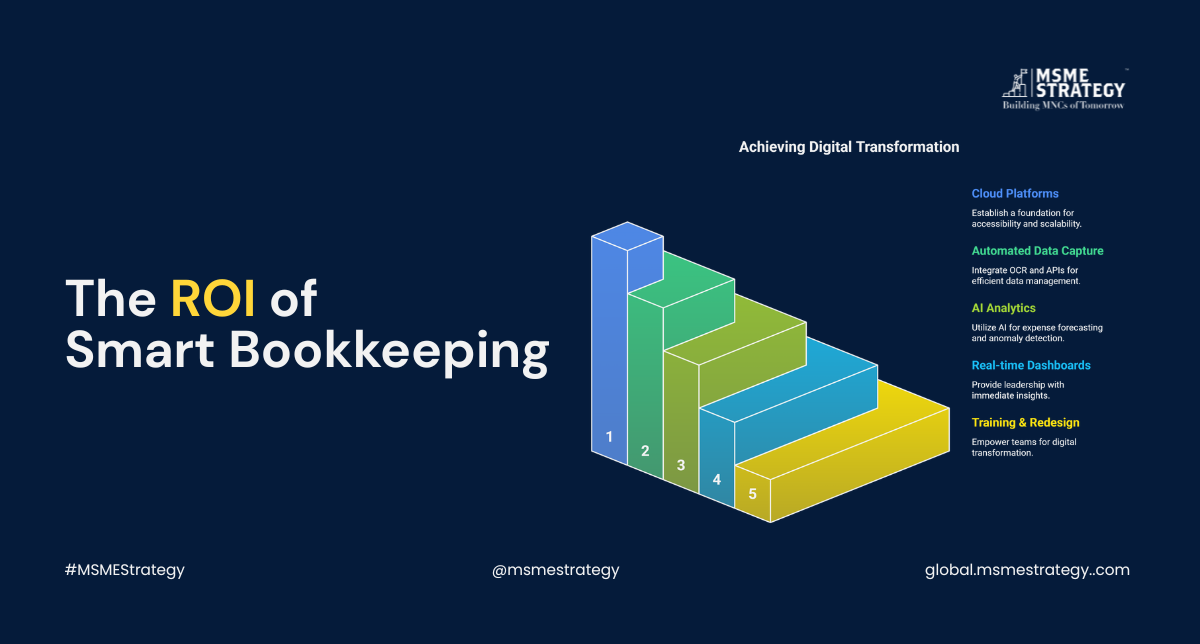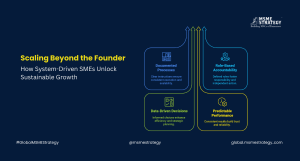In today’s hyper-competitive global business landscape, small and medium enterprises (SMEs) can no longer afford to treat bookkeeping as a mere compliance exercise. Modern bookkeeping—augmented by automation, cloud technology, and real-time analytics—has transformed into a strategic function that directly impacts profitability, cash flow, and decision-making agility.
For seasoned SME professionals, understanding the Return on Investment (ROI) of smart bookkeeping is essential not only for operational efficiency but also for building a scalable, resilient enterprise.
1. The Business Case for Smart Bookkeeping
Traditional bookkeeping models—manual data entry, delayed reconciliations, and static reporting—create friction across the financial cycle. In contrast, smart bookkeeping systems powered by AI, cloud integration, and automation bring three measurable outcomes to the forefront:
a. Time Savings
Modern solutions like Xero, QuickBooks Online, and Zoho Books automate repetitive tasks such as expense categorization, invoice tracking, and bank reconciliation.
- Average time saved: 25–40% of staff hours previously spent on manual entries.
- Impact: Finance teams can redirect saved time to analysis and strategic planning rather than data cleanup.
b. Reduced Errors and Audit Confidence
Manual bookkeeping is error-prone, with studies estimating up to 30 errors per 1,000 entries in traditional systems. Automation minimizes this risk through built-in validation checks and real-time syncing.
- Error reduction: Up to 90% fewer data-entry mistakes.
- Audit benefit: Transparent digital trails simplify compliance and reduce audit preparation time by 50%.
c. Faster Financial Close Cycles
Digital bookkeeping streamlines month-end and quarter-end closings through auto-matching, integrated dashboards, and real-time data visibility.
- Close cycle improvement: Average closing time drops from 10–12 days to 3–5 days.
- Result: Leadership gains quicker insights for agile decision-making.
2. The ROI Framework for Smart Bookkeeping
A clear profitability analysis should quantify both tangible and intangible benefits:
| ROI Metric | Traditional Approach | Smart Bookkeeping Outcome | Efficiency Gain |
| Manual hours per month | 160 hrs | 90 hrs | +70 hrs saved |
| Annual bookkeeping cost | $40,000 | $28,000 | 30% cost saving |
| Error correction expense | $5,000 | $500 | 90% reduction |
| Reporting lag | 2 weeks | Real-time | Continuous |
| Decision turnaround | Reactive | Predictive | Improved agility |
The compounded effect? A 25–50% increase in financial team productivity and up to 20% improvement in profit margins driven by faster decisions and reduced leakages.
3. Global Perspective: How SMEs Are Adopting Smart Bookkeeping
Across markets, SMEs are shifting from traditional accounting to digital-first models—driven by regulatory reforms and the need for financial transparency:
- Europe: SMEs adopting cloud-based bookkeeping report 35% faster financial close cycles (source: ACCA Global).
- Asia-Pacific: Digitization incentives in India, Singapore, and Australia have accelerated automation adoption, improving GST/VAT compliance efficiency.
- North America: AI-powered bookkeeping has led to a 20% drop in administrative overheads for small enterprises (Intuit report).
- Africa and Middle East: SMEs leveraging mobile-based accounting tools are improving financial inclusion and cash flow visibility for micro-businesses.
Globally, the trend is clear—smart bookkeeping is becoming the foundation of strategic finance.
4. Key Enablers of Bookkeeping ROI
To realize measurable returns, SMEs should invest in the following enablers:
- Cloud-based platforms for accessibility and scalability.
- Automated data capture through OCR and API integrations with banks and CRMs.
- AI-driven analytics for expense forecasting and anomaly detection.
- Real-time dashboards for leadership visibility.
- Training and process redesign to empower teams for digital transformation.
5. Actionable Steps for SME Leaders
If you’re looking to quantify and optimize your bookkeeping ROI, consider these actions:
–Conduct a Bookkeeping Audit: Identify manual processes and redundant steps.
–Select Scalable Software: Choose tools that integrate seamlessly with your ERP or CRM.
–Automate Repetitive Tasks: Start with invoicing, expense tracking, and reconciliation.
–Set KPIs for Finance Efficiency: Track time-to-close, cost-per-entry, and data accuracy.
–Review ROI Quarterly: Benchmark efficiency gains against cost savings and decision quality.
Smart bookkeeping isn’t just about numbers—it’s about turning financial data into a strategic asset. By quantifying time saved, errors reduced, and cycles shortened, SMEs can unlock measurable ROI and sustainable profitability. The shift to digital finance is no longer optional; it’s a competitive necessity.
At MSME Strategy Consultants, our experienced consultants help SMEs across the globe adopt efficient financial systems, streamline operations, and achieve measurable ROI through smart bookkeeping and financial strategy.
#GlobalMSMEStrategy #SmartBookkeeping #ProfitabilityAnalysis #SMEFinance #DigitalTransformation #BusinessEfficiency #FinancialAutomation #MSMEStrategy #BookkeepingROI






